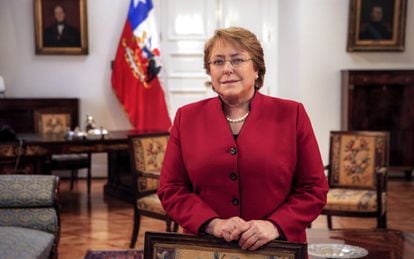“Abortion will be decriminalized this year”
The Chilean president discusses the first three months of her term and her plans for reform


The interview with Chilean president Michelle Bachelet took place inside La Moneda Palace, the seat of government, right after the World Cup game in which Chile lost 2-0 against The Netherlands.
But Bachelet smiled as she underscored the positive side to the game: “Chile played well.”
And that could well encapsulate the optimistic attitude that has prevailed throughout the first three months of her second term in office. Bachelet was also president between 2006 and 2010, after which she moved to New York to head the UN Women’s agency.
The lower house has approved tax reform, which is essential to fund part of her big goal: education reform
The optimism has been unflagging despite having had to deal with an earthquake in the north of the country as soon as she walked back into her office, not to mention the largest fire in the history of the city of Valparaíso, and flooding in the south.
But Bachelet, 62, says she is satisfied that none of those calamities stopped her from delivering on 90 percent of the 56 measures she proposed to undertake in her first 100 days in office.
Now the president feels that the time is right to eradicate Chile’s greatest problem: inequality.
For now, the lower house of parliament has approved tax reform, which is essential to fund part of her government’s big goal, education reform. Despite vocal criticism from the opposition, tax reform will pass in the Senate in the coming months.
Bachelet says that she remains open to dialogue and is willing to accept suggestions, but that she will not renounce the essence of her tax reform: those who have more must pay more.
We want to reach a new deal with all the indigenous peoples, not just the Mapuches”
She also hopes that by the end of the year Chile’s stringent abortion legislation will allow pregnancy terminations in the cases of rape, life-threatening fetal abnormalities and risk of death for the mother.
Question. While you headed the US Women’s agency (2010- 2014), how did you view Chile?
Answer. I saw a country with all the good things: a stable democracy, an economy with stable growth… But on the other hand youths were out [protesting] in the streets for about eight months. And it wasn’t just young people. Many people joined that process in a country that started to say: “What's out there is no longer enough.” And that motivated me to say that if I decided to return [to office], it would be to undertake profound changes.
Q. Is the Michelle Bachelet of the second term in office more or less left-wing than the Bachelet of the first term?
A. I have said that I've turned neither more red nor more green, but that perhaps I am putting citizen concerns center stage, rather than political colors. Inequality is our great enemy. And that is my fundamental point of reference.
Q. How were those first 100 days?
A. Intense. The first four years felt like too short a space of time, and we first had to meet our commitments with citizens. Politics needs to get its prestige back, and you also do that by honoring the commitments you have made. It is really important to recover people’s trust in our democratic institutions. Frankly, it feels like it’s been more than three months. Yet the time has come to implement many of those things. We’ve already defined what we need to do. Now we have to get going.
Q. Did you think you would run into so much trouble getting the tax reform underway?
We have a treaty from 1904 that clearly defined the Chile-Bolivia border”
A. Perhaps some people thought I wouldn’t actually go through with it. That it was a campaign promise that would be forgotten later on. When I was a presidential candidate for the first time and I was invited to come to Spain, some friends of mine who are leaders of [the labor unions] CCOO and UGT told me: “Never run a campaign based on tax reform. Nobody wins when they talk about tax reform.” I feel that, indeed, tax reform involves certain interests that could be affected by the changes, and who do everything in their power to change the core issues. We are very open to hearing out every sector. But I have already said that I am not prepared to alter what we refer to as the heart of the reform.
Q. Your government has halted the giant electricity project HidroAysén, in the Patagonia region, which aimed to build five dams. The decision was hailed by environmentalists who had been fighting the project in the courts for six years. But some people claim that the direct consequence of this will be a hike in electricity bills in a country that already has the most expensive rates in all of Latin America.
A. We are working hard on unconventional renewable energies with a long-term vision. We are committed to strongly supporting different sources of energy: natural gas, wind, geothermal and solar, besides water, of course.
Q. The daily La Tercera published a letter to the editor that said: “There will be no peace in La Araucanía as long as history continues to be ignored.” The reader suggested that the government buy land and return it to the original dwellers, the Mapuches, to repair what you yourself describe as a historical indebtedness with the indigenous people. What action is your government considering?
A. We want to reach a new deal with all the indigenous peoples, not just the Mapuches. I would like to say that since the year 1990 the Chilean state, throughout every government, has bought an enormous amount of land and transferred large amounts of it to the communities. And this will continue to be a major issue for this government. But it’s not just a matter of returning land. There also needs to be support and productive development. This involves a great many things. We are drawing up a working agenda.
Q. When will abortion be decriminalized?
A. In Chile this debate has taken place in parliament. There is an enormous amount of motions filed with the lower house and the senate. We are at the motion review stage and will decide which one to support and how to support it, so we can advance toward decriminalization.
Q. When do you think this might be possible?
A. I think it’s going to happen during the second semester, probably in the last months of the second semester.
I decided that the political capital I earned in my previous term in office was there to spend”
Q. Before the end of the year?
A. Yes. We will analyze the legislative techniques, but yes, before the end of the year.
Q. Despite the numerous internal differences within your alliance of seven parties, Nueva Mayoría (which includes Christian Democrats and Communists), do you feel that the coalition will remain united for four years?
A. I have no doubt about that. We all want an end to inequality. And we all understand why education reform is key to this.
Q. Why is a corridor to the Pacific Ocean for Bolivia non-negotiable?
A. We have a treaty from 1904 that clearly defined the border between Chile and Bolivia. For us, this treaty remains in force. We have honored everything established in the treaty, which stipulated giving them effective access to the sea through the use of seaports, though not sovereign access. I don’t have figures at my fingertips regarding the resources that Chile spends to honor the treaty of 1904, but they are enormous. We will continue to uphold our part of the treaty, but believe that we have to respect international law.
Q. Argentina feels certain admiration for the way government institutions work in this country. The transition between presidents, in particular, is considered exemplary. What do you admire about your neighbors?
A. First of all, education, which is free. Besides, Argentina is filled with tremendous potential and wealth. It has great men and women, scientists, literati, athletes… They have access to books at very affordable prices. They have all kinds of cultural expressions. I think there is a lot that we can learn from Argentina in that respect.
Q. What do you think about the new Spanish king, Felipe VI?
A. He seems to be very well prepared for the job, intelligent and very personable.
Q. Has the process of change been tougher so far than you expected?
A. I was expecting it. I was aware that today’s Chile wants results now. And so Chile will be much more demanding of me. The main thing, ultimately, is to speak truthfully. If something does not work out, explain it to the nation. If you notice, all surveys show a large majority supports reforms. Yet a significant percentage feel we are not going to manage it. But if I came back from New York it was because I decided that the political capital I earned in my previous term in office was there to spend.










































